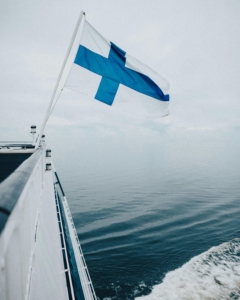Finnish names reflect the cultural and historical influences that have shaped the country’s customs starting especially in the early 20th Century. The structure of the names follows the classical European pattern of being composed of a surname and at least one given name. Family names can either be patronymics or inherited matrilineally, but they could also reflect the association with a particular area. Jaakko Jussila, for example, means Jaakko from the place of Jussi.
Initially, given names in Finland were of Christian origin, reflecting the influence of Saints’ names and their growing popularity in the region. This naming tradition highlights the distinctions between Eastern and Western Finland. The eastern part of Finland was influenced by the Russian regime and Slavonic Church sources, while the western part followed Western Christian influences.
Name selection has undergone a significant transformation over the last three decades, more so than in the past 100 years. This shift is attributed to changes in societal values and the emergence of personal autonomy among Finns, leading to a preference for more unique names with diverse origins.
Finnish names have a rich history, shaped by the country’s past as part of the Swedish Empire and under Russian control until 1917. These names, often rooted in antiquity, vividly capture the essence of Finland’s natural landscape. For instance, Ilmari translates to storm, while Tuulikki means wind, both reflecting the powerful and dynamic forces of nature that have influenced Finnish culture and identity.
The cultural influences of the 12th century also left their mark on Finnish names, giving rise to names such as Taavetti (“David”) and Yrjö (“George”). Additionally, Finnish names have been influenced by other cultures, such as:
Some Finnish names have origins that are difficult to track due to variations, adaptations, or cross-pollination between earlier names, such as Eija, Raili, and Saila. The Finnish nomenclature has also inspired names found in folk poetry, like Hilja (“silent”), Rauha (“peace”), Armas (“beloved”), and Urho (“hero”).
The Symbolism Encoded in Finnish Names
- Antti
- Aino
- Edvin
- Kristiina
- Jukka
- Anna
Antti is one of the most popular male given names in Finland, originating from the Greek name Andreas, which means man or manly. The name is also related to Andrew, a name of historical significance. The popularity of Antti can be traced back to the spread of Christianity in the Nordic countries, where it became a symbol of national identity. Notable figures such as pop singer Antti Tuisku and hockey player Antti Niemi have carried this name, further solidifying its cultural significance in Finland.
Aino is a popular Finnish female given name that translates to the only one. It has an interesting history, with its origins rooted in Finnish folklore collected by Elias Lönnrot, which tells the story of a girl who faced a challenging situation involving an arranged marriage to an older man.
During the Romantic Era at the end of 19th century, this name was adopted as a given name by the Fennomann movement – which wanted Finland to be considered separate from Sweden and Russia.
Edvin is another popular Finnish given name, with English origins, coming from the word ead, which has different meanings: wealth, fortune, wine and friend. It can be associated to affluence as well as loyalty.
It is especially preferred in the Nordic countries, and although historically it was popular among the nobility, it has gained international popularity. Despite its English beginnings, it remains relatively rare in places like the United States and England.
Kristiina is a popular female given name in Finland, derived from the Latin name Christina, which means follower of Christ. The name has a long history and has been widely used in Finland, reflecting both cultural and historical influences. Over time, Kristiina has become a symbol of Finnish identity and heritage. Notable individuals with this name, such as former President of Finland Tarja Halonen, whose middle name is Kristiina, highlight its significance and enduring popularity in Finnish society.
The name Kristiina is the name of the lead character in the famous Finnish historical novel series The Chronicles of the Åland Islands by author Anni Blomqvist. This series, particularly popular in Finland, has contributed to the name’s cultural resonance and has kept it beloved among Finnish readers.
The male given name Jukka has Nordic origins, from Iceland and Norway, and is rooted from the Latin Iohannes, that comes from the Greek Ioannes.
Expanding on this, Jukka is a Finnish diminutive of Johannes, now commonly used as an independent name. Officially, Jukka didn’t appear in records until the late 19th century and was added to the Finnish almanac in 1950, with its name day coinciding with June 24, the traditional midsummer day, also known as Juhannus. The name saw its peak popularity between 1960 and 1979.
Around the year 1000, the Vikings adapted the Latin name Iohannes to their native languages, leading to its widespread popularity in the Nordic regions. This adaptation marked the beginning of a long and storied history for the name, which would go on to become a staple of Nordic culture.
Anna is a beloved and enduring Finnish female given name with rich origins in both Greek and Hebrew. The name’s meaning, favor or grace, reflects its association with positive qualities and virtues. Anna has given rise to numerous variations, including Ann, Ana, Anaïs, Anette, and Anita, each with its own unique charm and character. These variations have allowed the name to adapt and evolve over time, making it a versatile and timeless choice for parents.
This name has been borne by several notable individuals, including American actresses Anna Kendrick and Anna Faris, the renowned Chief Editor of Vogue, Anna Wintour, and Romanian singer Anna Lesko. These accomplished women have not only contributed to the name’s enduring popularity but also helped to cement its cultural significance, making Anna a name that is both timeless and iconic.
Modern Approaches to Finnish Name-Giving
The current trends in name-giving in Finland are influenced by internationalization and the rapid pace of technological advancements and media. This has led to parents seeking uncommon names, with numerous lists, videos, and blog posts available for reference. The Finnish Names Act allows children to be given at most four given names, which often exhibit a mix of monosyllabic and polysyllabic names, such as Päivi and Marketta, respectively.
In recent decades, Finnish names have been influenced by various factors. Some names are gender-neutral, while others are assigned to a specific gender despite having neutral meanings. For example, Varma means certain but is typically given to females. Certain names are used for both genders, such as Misa, Oma, Tuisku, Venni, Kuu (“moon”), and Myrsky (“storm”).
Additionally, given names inspired by influential people, like Urho Kekkonen, Teemu Selänne, Veeti Kalli, Armi Kuusela, and Aleksis Kivi, have become popular. The resurgence of names from previous centuries is another trend, with names like Emma, Ella, Antti, and Olavi experiencing popularity peaks in different eras due to the cyclicality of fashion. Public figures also play a significant role in popularizing names, such as Teija Sopenen, Taina Elg, Viivi Avellan, and Veeti Kallio, whose given names have become favored due to their fame.
Finnish names have a rich history and cultural significance that reflects the country’s complex cultural heritage. From their ancient origins in nature and the influence of Christianity to modern trends and international influences, Finnish names have evolved to reflect the country’s unique cultural identity.
The recent shift towards personal autonomy and individuality has led to a greater emphasis on unique and uncommon names, often inspired by influential people and cultural trends. This dynamic evolution of Finnish names provides valuable insights into the country’s history, culture, and naming traditions, highlighting the ongoing interplay between tradition and innovation in Finnish naming practices.












